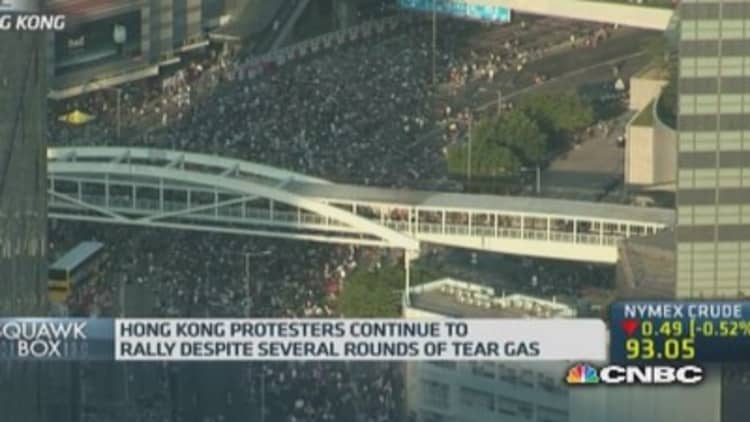What's happened?
Riot police advanced on tens of thousands of protesters in Hong Kong's Admiralty district on Sunday, and the stand-off continued Monday morning, in the territory's worst incident of unrest in decades.
Police responded with a baton charge followed by volleys of pepper spray and tear gas near government offices, while some protesters erected defensive barricades. Tear gas hasn't been used since a protest during the World Trade Organization meeting in 2005. Unconfirmed rumors suggest that the police may have used rubber bullets.
At least 38 people were injured and hospitalized on Sunday, while 78 were arrested including some leaders, according to CNN.
Will politics stir up an economic storm for Hong Kong?
How did it start?
The chaotic scenes followed a week-long boycott of classes led by Scholarism, a student group.
Starting last Monday, around 13,000 students campaigned against what many view as the encroachment of China's political will on Hong Kong's governance. The protest expanded over the weekend when the Occupy Central movement and Scholarism-led campaign coalesced.
The Occupy Central campaign was initiated by Benny Tai Yiu-ting, associate professor of law at the University of Hong Kong, in January 2013. A series of rallies over the summer of 2014, unsettled many Hong Kong residents, raising concerns about the territory's political future.

Why are they protesting?
Occupy Central is pushing for democracy in Hong Kong. Their goal is to gain a greater say when political candidates are nominated.
Britain handed Hong Kong back to China in 1997 as a 'special administrative region'. The territory has been ruled under the 'one country, two systems' formula agreed by then U.K. and Chinese leaders. Hong Kong citizens have more autonomy and freedom than their mainland counterparts, but the elective process is still partly controlled by China.
At present, Hong Kong residents can only vote for pre-approved political candidates under Chinese law, making it impossible for a critic of Beijing to get on the ballot. Political candidates need majority support from a 1,200-member nomination committee stacked with Beijing loyalists, under the universal suffrage plan unveiled by the Chinese government last month as part of an electoral reform.
Critics have dismissed Beijing's plan as a 'sham democracy,' prompting threats from pro-democracy activists to shut down the Central financial district.
Read MoreHong Kong resorts to tear gas to break up protesters
Is this unrest likely to spread?
Chinese leaders are worried that calls for democracy in Hong Kong could spread to the mainland.
In 1989, Beijing's bloody crackdown on pro-democracy students in Tiananmen Square sent shock waves through Hong Kong as people saw how far Chinese rulers would go to maintain their grip on power.
On Monday, student leaders in Taiwan occupied the lobby of Hong Kong's representative office on the island in a show of support for the democracy protesters, according to local media.
President Ma of Taiwan told Al Jazeera that he hopes China and Hong Kong can reach an acceptable solution, according to Reuters. Taiwan still maintains it does not accept 'one country, two systems', he said.

What now?
Protests will continue until Leung Chun-ying, the city's chief executive, resigns and Beijing changed its position on political reform,according to Benny Tai, Occupy Central's leader.
Yet, many protesters left late Sunday night after the Hong Kong Federation of Students encouraged them to retreat, citing concerns of escalated police force, but thousands remained.
The Hong Kong Federation of Students announced plans to indefinitely extend the class boycott that began last week, while the Hong Kong Professional Teachers' Union announced a strike on Monday to protest police brutality. However, many protesters told The Guardian they would need to leave on Monday to return to work.
Read MoreHong Kong group launches civil disobedience campaign


